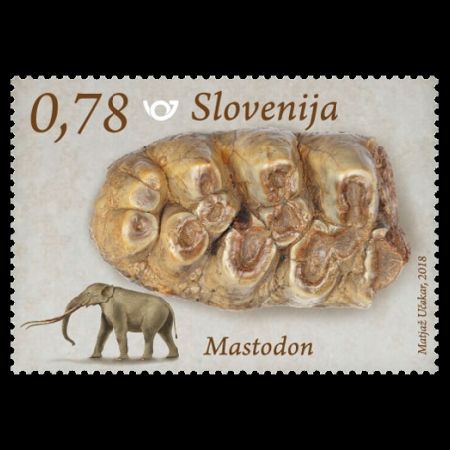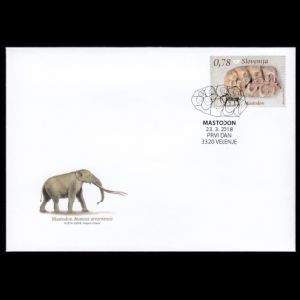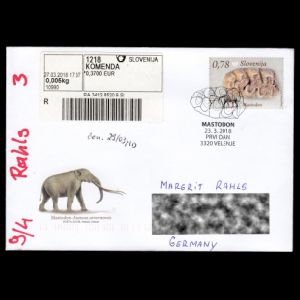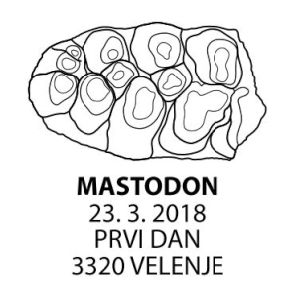Slovenia
2018
"Mammal Fossils of Slovenia: Mastodon"
| Issue Date |
23.03.2018 |
| ID |
Michel: 1297;
Scott: 1263;
Stanley Gibbons: ;
Yvert et Tellier: 1091;
Category: pF |
| Designer |
stamp design: Matjaž Učakar
photo: Matija Križnar from Natural History Museum of
Slovenia in Ljubljana
|
| Place of issue |
Postojna |
| Stamps in set |
1 |
| Value |
€0.78 - Mastodon, Anancus arvernensis |
| Emission/Type |
commemorative |
| Place of issue |
Velenjes |
| Size (width x height) |
42.60 x 29.82 mm
|
| Layout |
Sheet of 25 stamps |
| Products |
FDC x1 |
| Paper |
Tullis Russell Chancellor Litho PVA
RMS GUM, 102 g/m2
|
| Perforation |
14 x 14 |
| Print Technique |
Offset, 4 colours |
| Printed by |
Agencija za komercijalnu djelatnost
d.o.o., Zagreb, Croatia
|
| Quantity |
45.000 |
| Issuing Authority |
Posta Slovenije
|

On March 23
rd, 2018, Slovenian Post Authority issued the third stamp of their multi-year
set of "Mammals fossils in Slovenia" showing a fossil of a Mastodon.
The first stamp of the set was issued in
2016 and shows a fossil of a cave bear.
The following text was written by Matija Kriznar from the
Department of Geology, Natural History Museum of Slovenia
and was published on the website of Slovenia in 2016.
The Mastodon – Ancient Giant of the Forests
Two million years ago the landscape of Slovenia was very
different from the way we see it today.
The soaring Alps in the west and the forested landscape with patches of marsh and endless plains
in the east were an ideal environment for large proboscideans and other mammals.
One of the last European mastodons – of the
Anancus arvernensis species –
would periodically graze in forest clearings here.
Anancus arvernensis inhabited a large part of Europe, appearing in the late Miocene and surviving
until the start of the Pleistocene.
Some other species inhabited parts of Asia and Africa.
The
Anancus was very similar to today's elephants, although with much longer, straight tusks and
different-shaped teeth.
Fossil remains have been found in Slovenia in the Salek Valley, near Slovenska Bistrica and in many parts
of the Slovenske Gorice, Centibske Gorice and Goricko hill regions.
Teeth are the most frequently discovered remains.
The best-known site for such finds was discovered near the village of Skala, not far from Velenje,
where parts of a skeleton and tusks were also unearthed.
The new postage stamp depicts a mastodon tooth discovered more than 70 years ago in a gravel pit close
to Sveti Andraz in the Slovenske Gorice hill region.
This large tooth (a molar) is from the lower jaw, as also indicated by its strong root.
The age of the tooth is not entirely clear, but it is likely to have belonged to an animal that grazed
this hill area, covered with sparse woodland, in the late Pliocene.
Changes in the environment in the early Pleistocene, approximately two million years ago, also contributed
to the extinction of the last mastodon to roam across the territory of present-day Slovenia.
Today the mastodon's tooth is on display at the Natural History Museum of Slovenia.
The stamp also incorporates a form of augmented reality: use the HP Reveal app to scan the stamp on
a mobile device and launch an X-ray video of the cross section of the mastodon's tooth.

The bottom row of the stamp sheet, with labels under the stamps.
Products and associated philatelic items
| FDC (clean and used) |
First-Day-of-Issue Postmark |
 |
 |
 |
|
| Stamp Sheet |
|
|
 |
|
|
References
Technical details and short description:
Posta Slovenije,
Bulletin Nr. 120 (page 9 with text on Slovenian, German and Englsh languages),
colnect.
Acknowledgements:
Many thanks to
Dr.
Peter Voice from Department of Geological and Environmental Sciences, Western Michigan University,
for reviewing the draft page.







